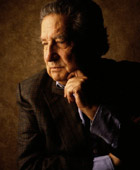Octavio Paz was born in Mexico City in 1914 to a family of Spanish and native Mexican descent. He was educated at the National University of Mexico in law and literature. Under the encouragement of Pablo Neruda, Paz began his poetic career in his teens by founding an avant-garde literary magazine, Barandal, and publishing his first book of poems, Luna silvestre (1933).
In his youth, Paz spent time in the United States and Spain, where he was influenced by the modernist and surrealist movements. His sequence of prose poems, Aguila o sol? (Eagle or Sun?, 1951) is a visionary mapping of Mexico, its past, present, and future, and Piedra de Sol (Sun Stone, 1957) borrows its structure from the Aztec calendar. This long poem, and Paz's sociocultural analysis of Mexico, El laberinto de la soledad (The Labyrinth of Solitude, 1950), established him as a major literary figure in the 1950s. In 1962, he became Mexico's ambassador to India and resigned six years later in protest when government forces massacred student demonstrators in Mexico City.
His later work shows an ever-deepening intelligence and complexity as it investigates the intersection of philosophy, religion, art, politics, and the role of the individual. "Wouldn't it be better to turn life into poetry rather than to make poetry from life," Paz asks. "And cannot poetry have as its primary objective, rather than the creation of poems, the creation of poetic moments?"
His various collections of essays engage culture, linguistics, literary theory, history, and politics with a level of originality and erudition that is unrivaled; these and his poems form a breadth of work that expresses, in the words of Carlos Fuentes, "the existence of a plurality of possibilities for harmony and truth, outside the limited range of our inherited dogmas." He was awarded the Cervantes Award in 1981, the Neustadt Prize in 1982, and the Nobel Prize for Literature in 1990. Paz died in 1998.
Biography from: Poets.org |






